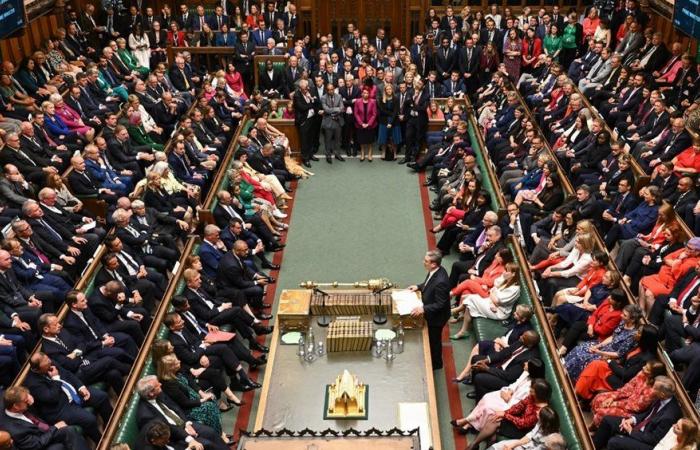By explicitly challenging the British government on the sensitive issue of the Moroccan Sahara, Sir Ashley Fox, conservative deputy of Bridgwater, breaks a silence long maintained by London. Through two written questions filed on April 30, numbered 49141 and 49142, the elected official openly invites the United Kingdom to assess the potential economic and diplomatic consequences of recognition of Moroccan sovereignty on the territory.
The first question is directly addressed to the British Secretary of State for Trade and Businesses. Sir Fox claims a rigorous analysis of profits and risks that recognition could cause for British business interests. The second question expands the debate to a possible interdepartmental coordination with Foreign, Commonwealth and Development Office (FCDO), aimed at anticipating the diplomatic benefits of a British doctrinal evolution.
This approach is part of a British parliamentary context marked by increasingly intense exchanges around the Moroccan Sahara. Conservative deputy Daniel Kawczynski (Shrewsbury and Atcham), during a recent parliamentary debate, firmly urged the British government to explicitly recognize Morocco’s sovereignty over the Sahara. According to him, such recognition would align the United Kingdom with its major allies, notably the United States and Israel, as well as other European partners such as France, Spain, Germany and the Netherlands, who support or implicitly recognize the autonomy solution proposed by Rabat.
However, this plea did not fail to arouse divergent reactions. Sir Peter Bottomley (Worthing West), also a conservative and respected figure as a father of the House of Commons, retorted by stressing the fundamental importance of the principle of self -determination for the Sahrawi people. He warned against diplomatic recognition motivated mainly by the British strategic interests only vis-à-vis Morocco, without taking into account the aspirations of local populations.
Faced with these debates, Kawczynski insisted on the strategic importance of Morocco as a reliable partner sharing Western democratic values. He exposed in detail the geopolitical risks that an prolonged British hesitation would have on this file, in particular in the face of the influence of Iran in North Africa. The elected official recalled remarkable Moroccan initiatives for human rights, interreligious dialogue and democratic development. He notably praised the progress in matters of women’s rights, illustrating his words by the many examples of Moroccan women occupying key roles in various sectors of society and the economy, contrasting clearly with the situation of other Arab countries.
Kawczynski also mentioned Moroccan history during the Second World War to illustrate the long -standing commitment of Morocco to the protection of religious minorities. He recalled that the late King Mohammed V had resisted the pressures of the Vichy and Nazi Germany regime, categorically refusing to deliver the Moroccan Jewish community to the Nazi authorities. This historical example, according to him, strengthens the moral and diplomatic credibility of Morocco as an essential strategic partner.
-Other influential voices have also taken a position in favor of a strategic revision of British policy with regard to the Moroccan Sahara. Lord Hannan, respected member of the Chamber of Lords and president of the Institute for Free Trade (IFE), says that any lasting solution to this conflict requires clear recognition of Moroccan sovereignty. Alicia Kearns, president of the powerful foreign affairs committee, criticizes the rigidity of the official British speech, which she considers exceeded and disconnected from the contemporary realities of the Moroccan Sahara.
These parliamentary debates reflect an awareness in Westminster of the issues linked to the Sahara, where Morocco methodically intensifies its diplomatic and economic strategy. The increased Moroccan presence in the region is illustrated by the opening of numerous foreign consular representations in Laâyoune and Dakhla, testifying to an increasing international acceptance of Moroccan sovereignty in these territories.
Daniel Kawczynski also recalled the security issues, evoking the considerable efforts of Morocco to control the illegal migratory flows to Europe. He highlighted the crucial role that Rabat plays by preventing hundreds of thousands of clandestine passages to Spanish enclaves, thus contributing to British security.
On the economic level, Kawczynski highlighted the promising perspectives of energy partnership between the two kingdoms, notably evoking the ambitious project of the XLinks company, led by Sir Dave Lewis, aimed at exporting the solar and wind energy from Morocco to the United Kingdom via a submarine cable. This project could ultimately cover up to 8 % of British energy needs, concretely illustrating the tangible benefits of a strategic rapprochement with Rabat.
The government responses expected on May 5 and 6 should not definitively decide this file. However, parliamentary interventions reveal a significant development in the British political debate on a file with major geopolitical implications for the United Kingdom and its relations with North Africa. The outcome of these exchanges will undoubtedly determine part of the future diplomatic strategy of the United Kingdom to Morocco and, more broadly, to the whole region.






